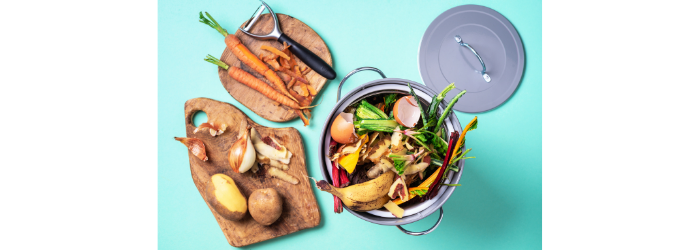Composting on High
Apartment living and composting are two things that many believe don’t go together.
by Matthew Leong

1) The Trusty Bokashi Bin!
The Bokashi bin is essentially an indoor compost bin. Not only are they designed to be odourless and not attract flies, but all organic waste (fruits and vegetable scraps) and even meats and dairy products can be added to them.
They’re easy to use. After adding all the food waste into the bin, add the Bokashi mix. The mix is typically made from dried organic matter that has been coated in micro-organisms. Afterwards, the waste needs to be pressed down before closing the lid. Over the next few weeks, the microbes will ferment the scraps and secrete a rich brown liquid. This liquid will flow to the bottom of the bin where it can be extracted with a tap. This liquid (affectionally dubbed ‘liquid gold’ by green thumbs everywhere) is like an energy drink for plants. But be careful. When using the liquid on indoor plants, it’s recommended ‘[to] dilute [it] at a rate of a teaspoon to [five] litres of water.’
2) Worm Farms (Are Not as Bad as You Think)
Worm farms are typically layered containers that can be stored in shaded areas such as under the kitchen sink or on appropriate balconies. Don’t put meat or dairy in a worm farm though! Organic materials including paper is the best food for your worms.
Simply place all your scraps into the worm farm and leave your worms to feast. The number of worms you have determines the amount of scraps you give them.When it comes to feeding and looking after your worms, play it safe and be reasonable. Correctly maintained worm farms never smell putrid. Instead, they smell like soil.
Want to save money? DIY worm farms are incredibly easy to make. Keep your worm farm out on the balcony or under the kitchen sink and protect it from extreme temperatures.
3) Are Electric Kitchen Composters More Your Style?
Just as their name suggests, electric kitchen composters (EKCs) speed up the composting process using technology. While there are different models that suggest slightly different time frames and procedures, EKCs all follow the same idea. Place your food waste into the machines, turn it on and wait for a few hours. In that time, EKCs will dry out the food scraps and grind them up into a fraction of what they once were. The remaining material is the compost that your plants are looking for.
At the end of the day, it’s understandable that the idea of decomposing food in a small space is unusual to many people. If you're still not entirely sold on the concept, could you donate your food scraps to a neighbour or a community garden?
It’s important to remember that it all works towards
reducing landfill and greenhouse gases. In Australia, approximately half of a household's waste is organic matter. When left in landfill, this waste will rot and produce methane (one of the causes of climate change).
Luckily, everyone can do their part to change this. It doesn’t matter if you live in a unit block in the suburbs or on the 16th floor of an inner-city apartment building, anyone can compost in a high-rise building and do their part to save the world.
So, what do you say? Are you ready to Step Up?
Matthew Leong is an editing/publishing graduate and writer based in Sydney. He's currently working on (what he hopes to be) his first novel.
Search for other blog topics:



